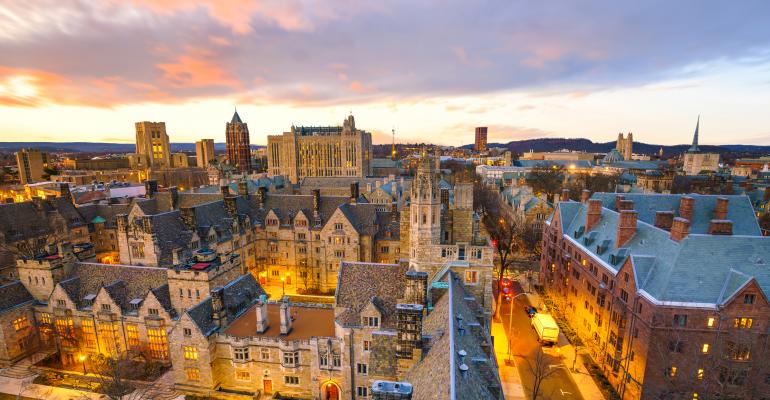(Bloomberg)—Rich universities are investing to save the heart of their college towns: the small businesses near campus.
Colgate University in Hamilton, New York; Williams College in the Berkshires town of Williamstown, Massachusetts; and Yale University in New Haven, Connecticut, are among schools that own commercial spaces and have waived rent since sending students home during the Covid-19 pandemic.
Columbia University in New York City has done the same for dozens of businesses, including Tom’s Restaurant, the diner at Broadway and 112th Street made famous in the TV show “Seinfeld.”
“I was worried how was I going to pay the rent, keep going and this and that. That was a big help for us,” said Michael Zoulis, part owner of the restaurant, which has been in his family since the late 1940s. Tom’s still had to lay off 25 to 30 workers, he said, as business dropped when Gov. Andrew Cuomo ordered almost all New Yorkers to stay home from work.
The relationships between colleges and college towns can be fraught. Schools are typically exempt from paying property taxes, and students can be unruly. But colleges need vibrant retail to make their communities thrive. The absence of customers since campuses sent students home is a threat to commercial districts’ survival. So are government orders to close most nonessential businesses.
Colleges in the U.S. own about 20 million square feet of retail space, according to CoStar Group Inc., a firm that tracks commercial real estate data. While some of the wealthiest schools can step in to help, those with more modest finances may be fighting for their very survival as enrollments that drive tuition revenue are uncertain. Williams is the richest U.S. liberal arts college, and Yale's wealth ranks second only to Harvard’s among U.S. private universities.
“Looking across all of retail, these owners and tenants and the lenders also all depend on each other,” said Kevin Cody, a senior consultant at CoStar. “If one of them fails, the other two will be impacted by it negatively.”
However, schools are not typical landlords.
“Universities are less likely to have their financial stability dependent on income from their retail space,” Cody said. “They may be able to weather the storm more than other owners of retail.”
Columbia's abatement is being offered to small, local businesses, most of the almost 350,000-square- foot portfolio, the school said. The Ivy League school declined to say what financial loss it is absorbing.
Colgate sits in the village of Hamilton, population of about 6,000. About 20 years ago, the university began buying boarded-up empty buildings and created a corporation, Hamilton Initiative LLC, to run the real estate arm. Today, the initiative owns about 111,000 square feet across 10 buildings, and it has offered its 15 tenants a rent abatement for three months, said Daniel DeVries, a college spokesman. They include a yoga studio, restaurants and a boutique.
It is costing the university about $100,000. Colgate’s endowment was $913 million as of March 2019.
“We want to do whatever we can to help them through this time period because we want their doors open and we want them thriving once this is all behind us,” said Joanne Borfitz, associate vice president for community affairs and auxiliary services.
While the movie theater and hotel owned by Hamilton Initiative have shut down, other businesses are still trying to make it.
That includes FoJo Beans Coffee Roasters, which celebrated its first anniversary in February and sits on the ground floor of a red-brick building on the corner of Utica and Madison, main drags in town.
The roasting business set up shop there because “Hamilton and the college wooed us in a way that we just couldn't resist,” said co-owner Dan Joseph. “The lure of continuous traffic was appealing.”
The three-month abatement will help now that the commercial kitchen is closed.
“We both felt a sigh of relief,” said co-owner Dan Foust. “Letting our crew go was probably one of the hardest things we’ve ever done.”
The business is still shipping beans to customers and fulfilling a small amount of orders for brewed coffee and tea. An area of the store has been turned into a mask-making station using Foust’s sewing machine. The chocolate shop next door donated elastic.
Coffee shops are seen as important to students, and to a sense of community. One at Columbia also received an abatement: Dear Mama Coffee, on the ground floor in the Jerome L. Greene Science Center at Broadway and 129th Street.
Its owner, Zachary Sharaga, said he has some breathing room for April and May while the shop stays open to serve the sliver of the population that’s still working in the building.
“This is a very scary time for most industries, especially the hospitality industry,” Sharaga said. “There’s a lot of uncertainty of what the landscape will be when the dust settles.”
To contact the author of this story: Janet Lorin in New York at [email protected].
To contact the editor responsible for this story: Philip Gray at [email protected]
Alan Mirabella
© 2020 Bloomberg L.P.





